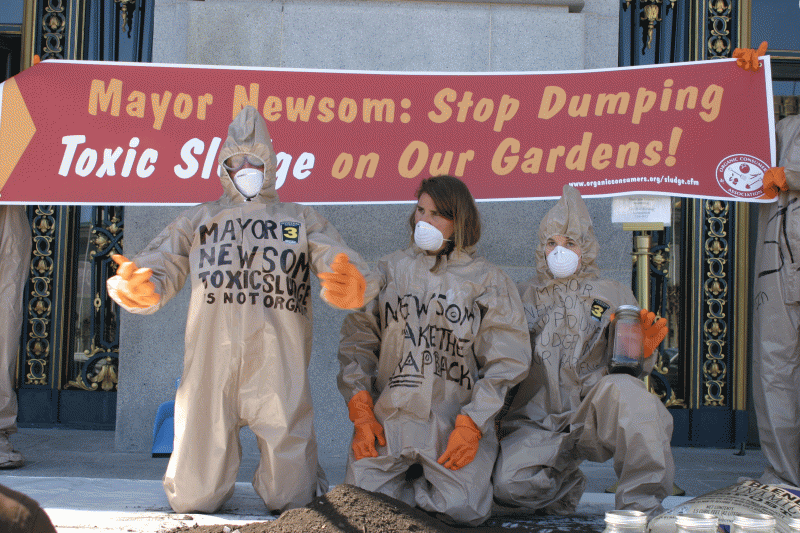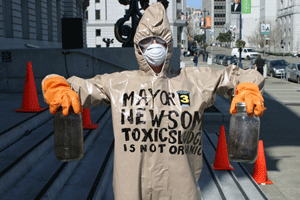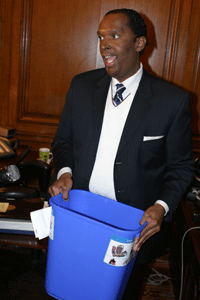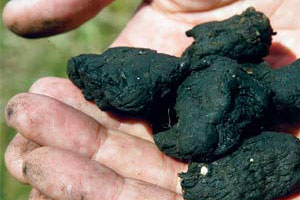
Front page photo: <a href="http://www.flickr.com/photos/44857113@N00/855639608/">DefMo</a> (<a href="http://creativecommons.org/">Creative Commons</a>)
Activists wearing face masks and haz-mat suits dumped a pile of sewage sludge on the steps of San Francisco’s city hall today to protest the city’s practice of marketing the material to home gardeners as “organic compost.” The US Department of Agriculture’s organic standards explicity prohibit organic produce from being grown on sludge-treated land. “The City of San Francisco owes an apology to all of the food consumers in California who have been eating non-organic food grown on sewage sludge,” said Ronnie Cummins, president of the Organic Consumers Association. He was wearing a haz-mat suit on which he’d written a message to San Francisco Mayor Gavin Newsom: “Organic gardens aren’t toxic waste dumps.”
Using sludge as fertilizer is a common practice; more than half of the sewage produced in America ends up being treated and applied to  gardens and farmland. The EPA considers sludge to be safe, but many food activists and some of the EPA’s own scientists disagree, pointing out that it can contain trace amounts of almost anything that gets poured down the drain, from heavy metals to endocrine disruptors–and that only a portion of these contaminants are screened for in sludge. (For more on the safety of sludge, check out “Sludge Happens” in our May/June 2009 issue).
gardens and farmland. The EPA considers sludge to be safe, but many food activists and some of the EPA’s own scientists disagree, pointing out that it can contain trace amounts of almost anything that gets poured down the drain, from heavy metals to endocrine disruptors–and that only a portion of these contaminants are screened for in sludge. (For more on the safety of sludge, check out “Sludge Happens” in our May/June 2009 issue).
The confusion over San Francisco’s “organic” sludge isn’t unique. The USDA doesn’t regulate which fertilizers can be labeled as organic, allowing anyone to use the term. But Cummins says it’s particularly misleading to apply the “organic” term to treated sewage sludge, which has been known to contain high levels of pollutants such PFOAs and flame retardants. Mother Jones‘ report that President Obama’s “organic” White House vegetable garden was planted on sludge-treated land led to considerable outcry  last year. In response to complaints from organic gardeners who say they were duped and to this CBS news segment, San Francisco has at least temporary suspended its public “compost giveaway events” and announced that it will no longer call the material “organic.”
last year. In response to complaints from organic gardeners who say they were duped and to this CBS news segment, San Francisco has at least temporary suspended its public “compost giveaway events” and announced that it will no longer call the material “organic.”
Still, Cummins wants San Francisco to stop using sludge as fertilizer and to help gardeners who accepted the material clean up their land. To press his case, he poured some sludge into a jars and marched into Newsom’s office, still wearing his haz-mat suit and a pair of safety goggles. After a moment, mayoral representative David Miree appeared and Cummins gifted him with the sludge sample. “Be careful with this stuff,” Cummins said. Another activist offered Miree her safety gloves. He politely declined them, but rather than holding the jars, walked out with them loaded into a garbage can.












